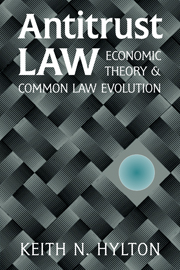Book contents
- Frontmatter
- Contents
- Preface
- 1 Economics
- 2 Law and Policy
- 3 Enforcement
- 4 Cartels
- 5 Development of Section 1 Doctrine
- 6 Rule of Reason and Per-Se Rule
- 7 Agreement
- 8 Facilitating Mechanisms
- 9 Boycotts
- 10 Monopolization
- 11 Power
- 12 Attempts
- 13 Vertical Restraints
- 14 Tying and Exclusive Dealing
- 15 Horizontal Mergers
- 16 Mergers, Vertical and Conglomerate
- 17 Antitrust and the State
- Index
4 - Cartels
Published online by Cambridge University Press: 12 November 2009
- Frontmatter
- Contents
- Preface
- 1 Economics
- 2 Law and Policy
- 3 Enforcement
- 4 Cartels
- 5 Development of Section 1 Doctrine
- 6 Rule of Reason and Per-Se Rule
- 7 Agreement
- 8 Facilitating Mechanisms
- 9 Boycotts
- 10 Monopolization
- 11 Power
- 12 Attempts
- 13 Vertical Restraints
- 14 Tying and Exclusive Dealing
- 15 Horizontal Mergers
- 16 Mergers, Vertical and Conglomerate
- 17 Antitrust and the State
- Index
Summary
Collusion with respect to price violates Section 1 of the Sherman Act. However, because most collusive agreements are not explicit, Section 1 of the Sherman Act is difficult to enforce. The participants in a collusive agreement have strong incentives to hide it, given that it is unlawful and that consumers would object to it anyway. Thus, the interesting problems in applying Section 1 to collusive agreements, or cartels, are typically issues of inference and of determining the scope of the statute. In other words, the difficult issues are: when does the evidence demonstrate collusion, and what constitutes unlawful collusion? This chapter provides an overview of these problems.
CARTELS
Basic Theory
At the heart of Section 1 of the Sherman Act is a concern over the effects of cartels. A cartel is a group of firms that seeks to increase profits by restricting price and output competition among themselves.
The fundamental result of the theory of cartels is that cartels are unstable, in the sense that they are not “self-enforcing.” The theory draws on the classic Prisoner's Dilemma of game theory. Consider an example of collusion between two competing firms, with the following payoffs shown in Figure 4.1.
The first element is the payoff to firm 1, the second the payoff to firm 2. If both firms collude, they receive $3 billion each. If one colludes (i.e., sets a high price) while the other competes, the competitor receives $5 billion, and the “colluder” loses $1 billion.
- Type
- Chapter
- Information
- Antitrust LawEconomic Theory and Common Law Evolution, pp. 68 - 89Publisher: Cambridge University PressPrint publication year: 2003

